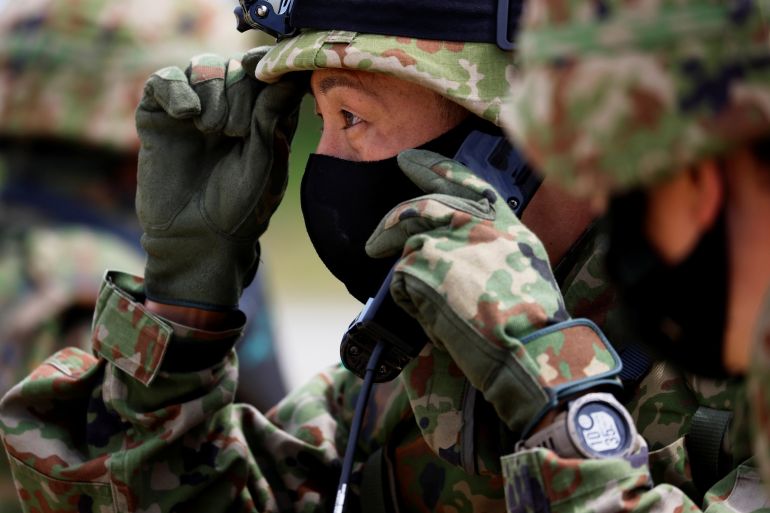Japan warns of rising security threats in annual defence report
Tokyo expresses concern that Moscow’s invasion of Ukraine could set a dangerous precedent.

Japan’s defence ministry has said it is alarmed at new threats from Russia and has growing worries about Taiwan, in an annual defence report that comes as Tokyo weighs an unprecedented rise in military spending.
The paper, released on Friday, also sets the stage for a year-end national security review expected to call for the acquisition of longer-range strike missiles, strengthened space and cyber capabilities, and tighter controls over access to technology.
Recommended Stories
list of 4 items- list 1 of 4Japan says missing F-15 fighter probably crashed, crew missing
- list 2 of 4US, Japan chide China as they deepen defence ties
- list 3 of 4Australia, Japan sign ‘historic’ defence pact amid China concerns
- list 4 of 4North Korea fires suspected ballistic missile: Japan, South Korea
The document devotes a chapter to Russia’s invasion of Ukraine, which it said risked sending the message “that an attempt to unilaterally change the status quo by force is acceptable,” with repercussions for Taiwan, which Beijing views as its own territory.
Surveying the global security landscape and specific threats to Japan, it said there was concern Russia could “further enhance and deepen relationships with China” and warned Moscow might increasingly lean on its nuclear capacity as a deterrent.
Japan, which has territorial disputes with Russia, has backed sanctions led by the United States and the European Union against Moscow, and has seen increased Russian military activity around its territory.
In May, Chinese and Russian military jets carried out joint flights near Japan immediately after a meeting of the US-led Quad grouping in Tokyo.
Self-ruled Taiwan has also been the target of an increasingly assertive China with military planes engaging in regular incursions into the island’s air defence zone.
Earlier this month, fighter jets crossed the Taiwan Strait’s median line, the unofficial buffer between China and Taiwan, a manoeuvre criticised by Taipei as a “provocation”. Beijing claims it has sovereign rights and jurisdiction over the waterway.
Beijing said it firmly opposed Japan’s new defence paper and had sent stern representations to Tokyo.
“Japan’s new defence white paper makes accusations and smears China’s defence policy, market economic development and legitimate maritime activities,” Chinese foreign ministry spokesman Wang Wenbin told a daily news briefing.
Wang said the report “exaggerates the so-called China threat” and interferes in China’s internal affairs on Taiwan.
“China has expressed its strong dissatisfaction and resolute opposition to this, and has lodged stern representations to the Japanese side about this,” he said.
Wang noted that the defence white paper mentioned Tokyo’s plan to increase Japan’s defence budget and develop its counterstrike capabilities.
“We urge the Japanese side to immediately stop the erroneous practice of exaggerating security threats in its neighbourhood and finding excuses for its own strong military arsenal,” Wang added.
The defence white paper approved by Prime Minister Fumio Kishida’s government also identifies North Korea as a critical security risk. Defence Minister Nobuo Kishi last month described Japan as being on a front line surrounded by nuclear-armed actors.
Most Japanese appear to share government concerns over Japan’s deteriorating security environment, with recent opinion polls putting support for higher defence spending at more than 50 percent.
Kishida’s ruling Liberal Democratic Party has pledged to double military spending to 2 percent of Japan’s gross domestic product (GDP), which would bring the country into line with the minimum commitment among NATO members.
Given the size of its economy, the increase would make Japan the world’s third-biggest spender on defence after the US and China.